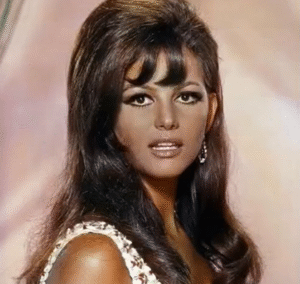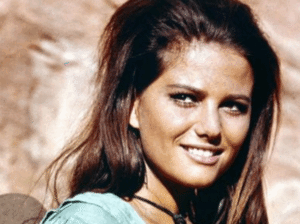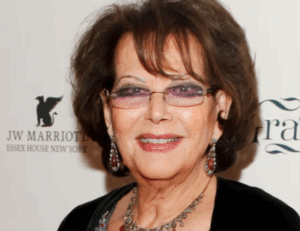Claudia Cardinale: A Timeless Journey Through the Heart of Cinema

Few stars have illuminated the screen with the same brilliance, grace, and emotional depth as Claudia Cardinale. Emerging during the golden age of Italian and European cinema, she became more than an actress — she became a symbol of beauty, intelligence, and authenticity. Her career, spanning more than six decades, is a testament not only to her immense talent but to her enduring love for the art of storytelling.
Her name alone evokes a particular era of filmmaking — a time when directors dared to experiment, when films were poetic and philosophical, and when actresses like Cardinale brought both elegance and power to the screen.
Yet behind the glamorous image and red-carpet appearances lies the story of a woman who worked relentlessly to carve her own path in a world that often underestimated her strength.
Early Life and the Seeds of a Legend
Claudia Cardinale’s journey began far from the cinematic capitals of Europe. Born in Tunis, Tunisia, in 1938 to Sicilian parents, she grew up in a melting pot of languages and cultures. Italian, Arabic, and French mingled in the streets where she played, giving her a worldview that would later enrich her artistry and emotional intelligence.
In interviews, Claudia has often recalled her childhood as one of curiosity and discovery. She was not initially drawn to acting — in fact, she was quite shy. But fate had other plans.
At just 17 years old, she entered — and unexpectedly won — a local beauty contest titled “The Most Beautiful Italian Girl in Tunisia.” The victory caught the attention of Italian filmmakers, and before long, she was invited to Rome. Though hesitant at first, she accepted the opportunity — a decision that would change her life forever.
Breaking into the World of Cinema
Arriving in Italy in the late 1950s, Cardinale found herself at the center of a rapidly evolving film industry. Post-war Italian cinema was entering a renaissance, giving birth to neorealism and later, to art cinema. The country’s studios were bustling with creativity, innovation, and ambition — and Claudia was about to become one of its brightest lights.
Her early work caught the eye of producers and directors who quickly recognized that she was not just another pretty face. Her beauty was undeniable, but what truly set her apart was the quiet intelligence in her gaze, her natural screen presence, and her instinctive understanding of emotion.
Soon, she was cast in films alongside Italy’s biggest names — Marcello Mastroianni, Vittorio Gassman, and Alberto Sordi — and under the direction of cinematic masters like Luchino Visconti and Mauro Bolognini. Each role she played deepened her confidence, sharpening her craft and expanding her range.

The Rise of an International Icon
By the early 1960s, Claudia Cardinale was no longer an emerging actress — she was a phenomenon. Her combination of beauty, poise, and quiet intensity captivated audiences not just in Italy but across Europe and eventually, Hollywood.
Her collaborations with directors such as Federico Fellini (8½), Sergio Leone (Once Upon a Time in the West), and Luchino Visconti (The Leopard) cemented her place among the greatest actresses in cinema history.
In 8½, she embodied an ethereal muse — mysterious, confident, and dreamlike — representing the creative ideal of Fellini’s complex protagonist. In The Leopard, she stood as the symbol of change and vitality amidst the decline of an aristocratic world. And in Once Upon a Time in the West, she transformed from damsel to survivor, portraying strength in the face of brutality and loss.
Each performance revealed a new layer of her artistry. Critics hailed her as a rare actress who could command attention without ever shouting for it — who could convey oceans of feeling through silence, a look, or a single movement.
A Woman in a Man’s World
Though celebrated, Cardinale’s career was not without struggle. Working in an industry largely dominated by men, she often faced the challenge of being typecast or underestimated. Many saw her primarily as a beauty symbol, but Claudia was determined to be more than that.
She once remarked, “Beauty is not enough. It opens doors, but talent keeps them open.”
Throughout her career, she fought for complex roles that reflected women as they truly were — strong, vulnerable, intelligent, and real. She refused to conform to superficial expectations and instead chose characters that spoke to her heart and challenged her mind.
Her resilience in navigating fame while maintaining her integrity made her a quiet revolutionary. Long before the global conversation on gender equality in film began, Claudia Cardinale was proving that women could lead with both elegance and authority.

Beyond the Screen: The Advocate and the Artist
As her fame grew, so did her influence beyond cinema. Claudia became a cultural ambassador for Italian film, frequently attending festivals, retrospectives, and international events. Her poise and dignity made her an unofficial spokesperson for an era that defined cinematic artistry.
She also used her platform to advocate for social and humanitarian causes. Over the years, Cardinale became a UNESCO Goodwill Ambassador, championing women’s rights and education. She often spoke about the importance of empowering young girls to pursue their dreams, no matter the odds.
Even as she aged — gracefully and proudly — she continued to reject the notion that a woman’s worth diminishes with time. Instead, she embodied the idea that true beauty is intertwined with character, wisdom, and authenticity.
Reflections on a Lifetime in Film
Now in her later years, Claudia Cardinale remains an active figure in the cultural landscape. She continues to attend international film festivals, where she is honored not just for her legendary roles but for her lasting impact on cinema itself.
In interviews, she speaks fondly of her early days — of shooting under the blazing desert sun with Sergio Leone, or the surreal atmosphere on Fellini’s sets. Yet, she is equally interested in discussing the future of film and the new generation of filmmakers shaping its direction.
Her advice to aspiring actors is simple but profound: “Acting is about truth — not perfection. If you are honest, the audience will see it.”
The Legacy of Claudia Cardinale
Claudia Cardinale’s legacy is impossible to measure in awards alone — though she has received many, including lifetime achievement honors from Cannes, Venice, and Berlin Film Festivals. Her true legacy lies in the inspiration she continues to give.
She showed the world that an actress could be glamorous and serious, powerful and gentle, resilient and kind — all at once.
Today, countless actresses, from Italy to Hollywood and beyond, cite her as a guiding influence. Her courage to demand respect, her refusal to be diminished, and her lifelong devotion to her craft have made her an enduring role model.
As cinema evolves, Claudia’s body of work stands as a bridge between the golden age of film and the modern era. Her characters remain timeless because they speak to something deeply human — love, longing, courage, and the search for self.
A Living Testament to Art and Humanity
Claudia Cardinale’s story is more than that of a movie star. It is the story of a woman who turned her life into art, and her art into a reflection of life.
From the bustling streets of Tunis to the grand stages of Cannes and Venice, from the intimacy of character-driven drama to the vast landscapes of epic Westerns — her journey has been extraordinary.
She continues to remind us that cinema is not just entertainment, but a mirror of our collective soul — capable of stirring empathy, awakening emotion, and shaping culture.
As she once said, “Every film I made was a part of my life — a moment, a feeling, a piece of who I am.”
And through every frame, Claudia Cardinale remains luminous — not because of fame or beauty, but because of the sincerity she brought to every role and the dignity with which she has lived her life.
The Final Word
Today, as audiences revisit her films and new generations discover her brilliance, Claudia Cardinale stands as a timeless reminder of what cinema can be: emotional, daring, and deeply human.
Her story is one of courage, resilience, and the quiet strength that has defined her from the beginning.
More than six decades after her debut, her presence continues to inspire filmmakers, actors, and dreamers across the world — a living link to a time when art was pure, and storytelling was sacred.
Claudia Cardinale remains, and will always be, a legend — not only of Italian cinema but of the global language of film itself.